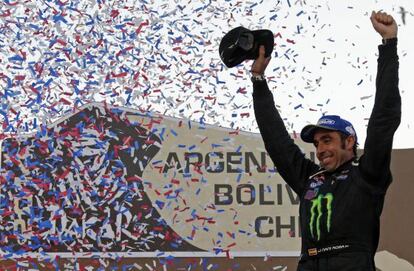“People try to destabilize you”
Nani Roma swapped his bike for a car and has won the Dakar again, 10 years on


For the very first time, he has seen what stress is like when it lasts into victory, rather than just in the race. Nani Roma, from Folgueroles, Barcelona, won the Dakar Rally in the car category on Saturday, 10 years after he achieved the same feat on a motorbike. But that win a decade ago bore little resemblance to this one, which was characterized by ugly gestures, hurtful comments, and a seemingly endless final three days, when the pressure was at its greatest. The tense situation came about not only because team orders were involved to ensure Roma's victory, but also thanks to the flouting of those orders by Stéphane Peterhansel, his teammate, rival and friend.
Question. What was Nani Roma like 10 years ago?
Answer. Younger. I can't remember much because time goes by so quickly... I had fewer wrinkles. These days my back hurts more and I have another child.
Q. When did you suffer more, in 2004 or this year?
A. This year. Definitely. The second week was incredibly tough. Although the whole race was very intense because when you start and everyone tells you that you are definitely going to win, it's very hard to manage all of that. But we did it. That is what gives me most satisfaction from this win.
Q. After what has happened over the last few days, are you happier about the win or more angry about how it all came about?
A. I am very pleased with the win. For a driver like Peterhansel to stop on the last day to let me by means that I did something right this week. I was the leader for eight days, with the third-placed driver an hour away, and the fourth an hour-and-a-half. We have done a really good job on the hardest Dakar since they started running it in South America, so I am really pleased.
Q. What bothered you the most after you found out about the team orders?
A. More than anything, what Stepháne did, because in the Dakar 2007 Mitsubishi stopped the race so that he would win. I don't understand why he didn't say at the time that there were team orders. What's more, this time there weren't any clear orders, there was an instruction to slow the pace, but not to stop, as was the case in the last stage: "On Saturday, at kilometer 138, Stepháne, you must stop, and Nani you must pass." And that's all there is to it.
I don't understand why he didn't say at the time that there were team orders"
Q. Peterhansel and Roma were friends three days before the end of the Dakar. Are they still friends?
A. We are. There's no problem.
Q. Does it worry you when you think about what might have happened had there not been that instruction to guarantee your win?
A. You can't think about what might have happened. At the end of the day all that counts is who won. I ran a great race, and I worked really well with Michel (Perín, his codriver). I'm not interested in anything else.
Q. How do you manage the race when you're leading?
A. It's really, really hard. Even more so given the hostile environment that there was in the team. There is a lot more pressure. You have drivers around you, with whom you have to get on every day, even though you know that they want to destabilize you. You have to know how to manage that. And I knew.
Q. What was it that led you to lose the considerable advantage you had over Peterhansel?
A. We made a number of different mistakes. We lost a few minutes due to punctures, we spent seven minutes stuck in a dune... There was a series of errors, unlike what happened during the first week, which we managed very well. All of that meant that we found ourselves in a tricky situation.
Q. What are you best at?
A. I simply believe that I have been lucky enough to take part in a lot of rallies this year. And I have won all of those I've taken part in. That gives you a lot of confidence.
Tu suscripción se está usando en otro dispositivo
¿Quieres añadir otro usuario a tu suscripción?
Si continúas leyendo en este dispositivo, no se podrá leer en el otro.
FlechaTu suscripción se está usando en otro dispositivo y solo puedes acceder a EL PAÍS desde un dispositivo a la vez.
Si quieres compartir tu cuenta, cambia tu suscripción a la modalidad Premium, así podrás añadir otro usuario. Cada uno accederá con su propia cuenta de email, lo que os permitirá personalizar vuestra experiencia en EL PAÍS.
¿Tienes una suscripción de empresa? Accede aquí para contratar más cuentas.
En el caso de no saber quién está usando tu cuenta, te recomendamos cambiar tu contraseña aquí.
Si decides continuar compartiendo tu cuenta, este mensaje se mostrará en tu dispositivo y en el de la otra persona que está usando tu cuenta de forma indefinida, afectando a tu experiencia de lectura. Puedes consultar aquí los términos y condiciones de la suscripción digital.








































